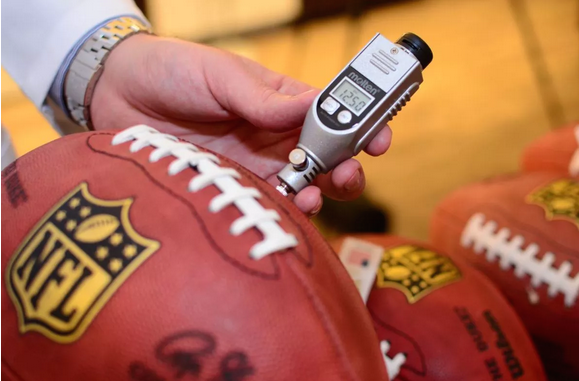Just in Time for Super Bowl XLIX: Engineers Show Weather May Have Caused Patriots’ Footballs to Deflate

Tests show weather may have been to blame for New England Patriots’ deflated football controversy. Image courtesy of HeadSmart Labs.
Latest News
January 30, 2015
As has been widely reported, NFL officials said 11 out of 12 of the New England Patriots’ footballs were below standard pressure by 2 PSI during the AFC Championship in which the Patriots outscored the Indianapolis Colts 45-7. That news led to accusations of cheating, which both New England quarterback Tom Brady and coach Bill Belichick have denied. The event has come to be known as DeflateGate.
 Tests show weather may have been to blame for New England Patriots’ deflated football controversy. Image courtesy of HeadSmart Labs.
Tests show weather may have been to blame for New England Patriots’ deflated football controversy. Image courtesy of HeadSmart Labs.Now, HeadSmart Labs, which develops testing devices intended to reduce sports-related concussions, has concluded a study on football inflation levels in various climates.
The company, which was founded byThomas Healy, a masters student studying mechanical engineering at Carnegie Mellon University, wanted to see if the weather could have caused the footballs to lose that much air during play. Researchers started with 12 footballs at 12.5 PSI in a 75ºF room.
To simulate game conditions, the footballs were then exposed to water and placed in a 50ºF room. According to study findings, the footballs dropped an average 1.1 PSI from the temperature difference. When the football was wet, it lost an additional 0.7 PSI. With the combination of both elements, the footballs lost between 1.8 PSI and 1.95 PSI.
“We took 12 brand new authentic NFL footballs and exposed them to the different elements they would have experienced throughout the game,” said Healy. “Out of the 12 footballs we tested, we found that on average, footballs dropped 1.8 PSI when being exposed to dropping temperatures and wet conditions.”
The full research report can be downloaded here.
Below is a video discussing the study:
For more information, visit HeadSmart Labs.
Sources: Press materials received from the company and additional information gleaned from the company’s website.
Subscribe to our FREE magazine, FREE email newsletters or both!
Latest News
About the Author
DE’s editors contribute news and new product announcements to Digital Engineering.
Press releases may be sent to them via [email protected].






